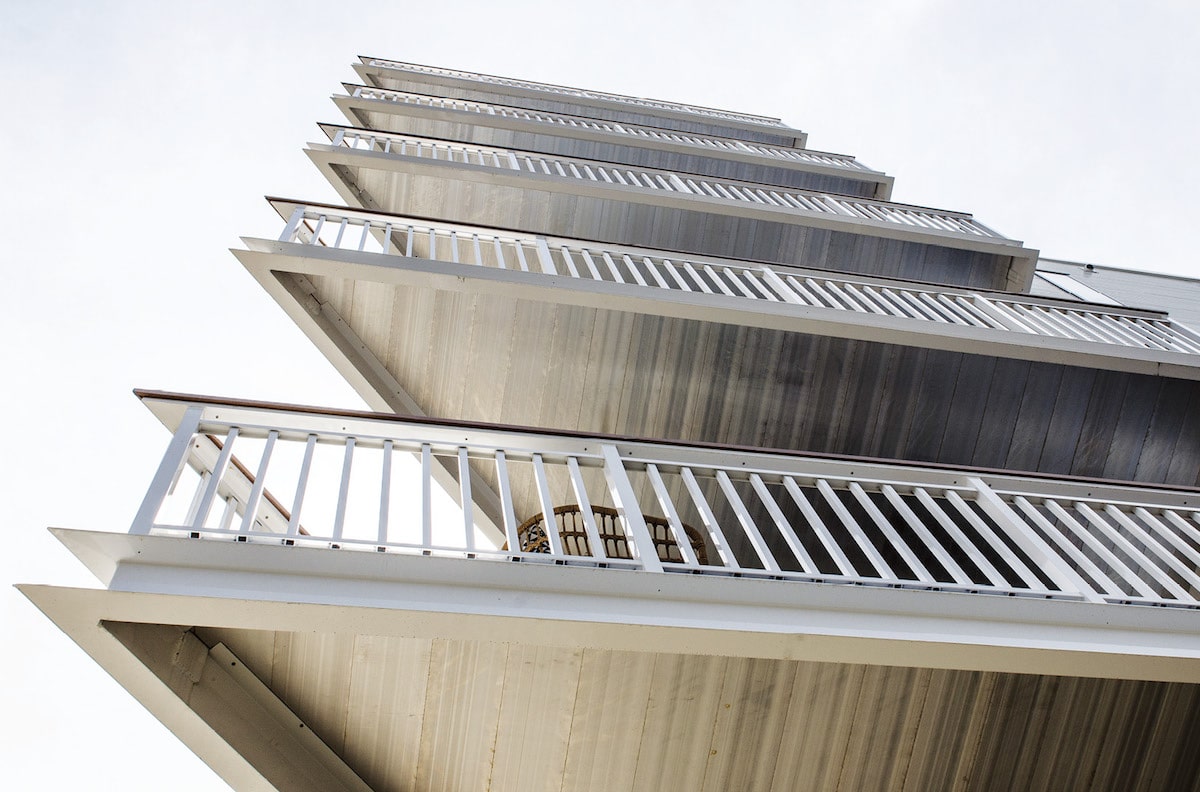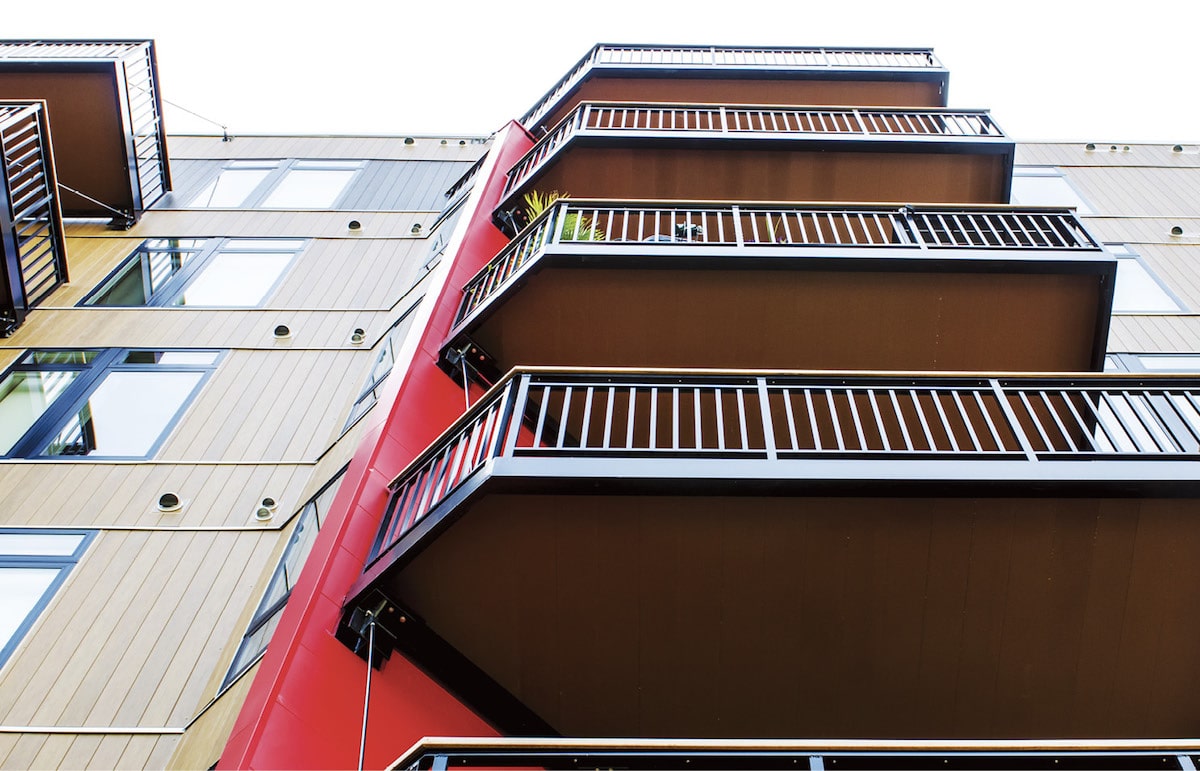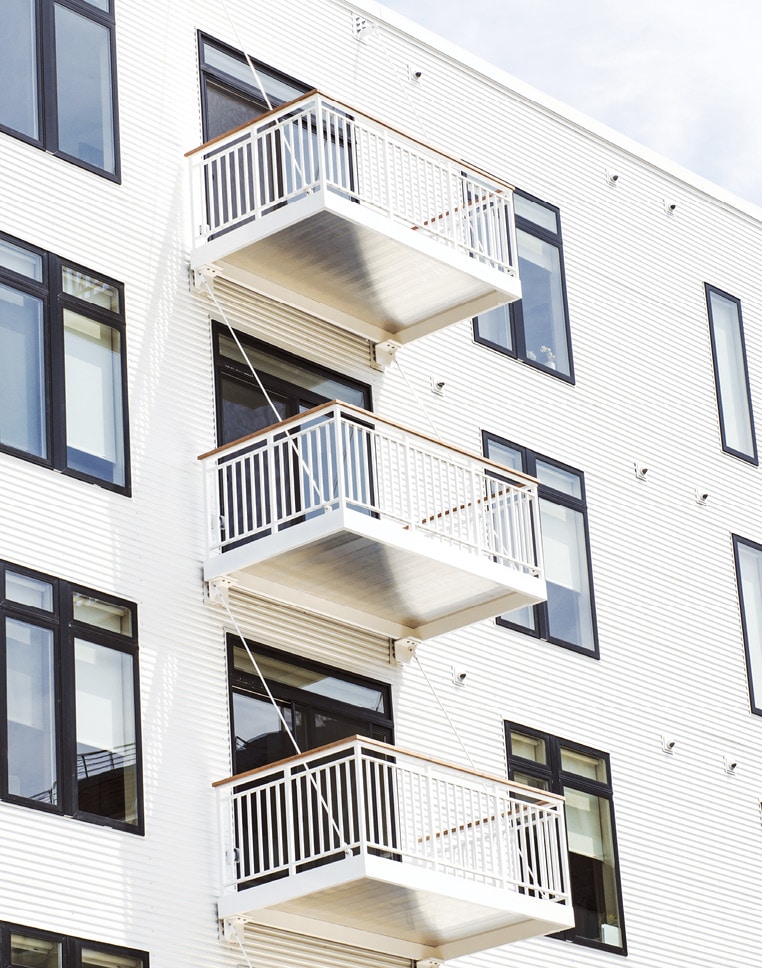
[Photo: Nicole Agen]
Midwest Stairs & Iron’s prefab aluminum balconies don’t skimp on design.
It’s hard to lease a multifamily housing property without balconies these days. “At one time it was a design statement, but now it’s expected,” says Eric Ponto, partner at Engberg Anderson Architects in Milwaukee. “It becomes additional living space for the people who live there.”
Balcony installation can be difficult and expensive, requiring in-field laborers to put the structures together while attaching them to the building. Depending on what they’re made of, maintenance can be an issue—think rotting wood or rusting metal. But prefab aluminum balconies from Midwest Stairs & Iron are changing the modern American balcony by making installation easier and reducing maintenance.
It’s why Ponto, who’s worked on multifamily housing projects for 18 years, has used Midwest Stairs & Iron’s prefab balconies since 2012. “We like the idea of them being ready to hang on the building when they arrive on the site,” he says. “Structural engineers like them because they weigh less than the steel balcony systems we used to use, and you don’t have to worry about the rust.”
Improved Installation & Durability
The prefab balconies are delivered by truck to the construction site ready to go. Workers unload the completely welded, seamless, and smooth structures; locate the correct part numbers; and bolt them on to the building using the map provided. As many as 25 balconies can be installed in six hours. “There is no finding all the pieces to put together and constructing them on-site, which is a huge value,” says Midwest Stairs & Iron Owner Howard Wurgler.
Balcony maintenance is minimal, too. Unlike wood or steel, aluminum won’t rot or corrode over time, so you won’t need to replace it. If something happens to a rail or if a tree falls and damages the structure, it can easily be replaced with a new balcony or repaired.
Before being shipped, balconies are powder-coated to create a hard finish that’s tougher than traditional paint and releases fewer VOCs. And because it’s made of aluminum, Wurgler says the balcony should last forever.
FROM OUR NOV+DEC 2018 ISSUE

The preferred publication of leading green professionals.

[Photo: Nicole Agen]
Design Versatility
Prefab sometimes gives people the idea that what you see is what you get, but that’s not the case with Midwest Stairs & Iron. Each balcony is made to order. Wurgler loves when designers meet with him early in the process to determine the look and feel of the structure.
When working with Ponto on The North End project—a multiple phase, multifamily housing development in Milwaukee—Wurgler helped to develop a unique, aesthetically pleasing product. “We’ve found so many options for customization—the rails, the decking itself, and colored glass. We’ve been able to use the same product but customize the look for each project,” Ponto says. “Howard has always gone above and beyond with the design aesthetics and really pushed the limits of his equipment. It’s impressive.”
The company has 12 standard colors they typically use and, while the whole balcony is typically painted one color, the possibilities are endless. The powder coating itself offers a couple thousand color options. Rails also can be designed in different patterns, and those with glass can be a variety of colors and may contain etched patterns. Wurgler is always looking to expand design options, too. He even experimented with creating a glow-in-the-dark glass to use for balcony rails. “We are very motivated to keep up with the trends,” he says.

[Photo: Nicole Agen]
Higher Standards
Wurgler began producing balconies after finding that he wasn’t comfortable installing another company’s. “They were not up to my standards, and I was very nervous about installing them,” he says. “I got together with my staff and designed one that was made as one—all welded construction.”
Wurgler has also made safety and durability a top priority in producing his balconies, which typically take three to four hours each to make, depending on customization. “People are standing out on these things. It’s a life/safety issue to give them the best product I can give them,” he says. “You see a lot of balconies falling off older buildings, and that’s because of how they were designed. They weren’t designed to last 100 years.”
WHY THIS MATTERS
A big part of sustainability centers on reducing waste. Americans generate more waste than any other nation in the world, according to the EPA. Using materials with a longer life can drastically cut down on how much goes into landfills. Aluminum is a long-lasting, durable material.
In addition, prefabrication cuts down on waste that can occur at the job site by ensuring products are constructed responsibly and properly within a factory space.
